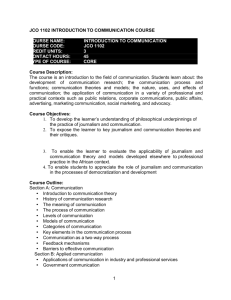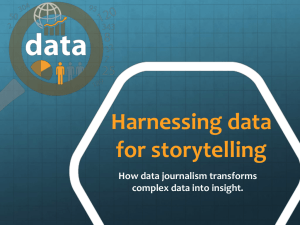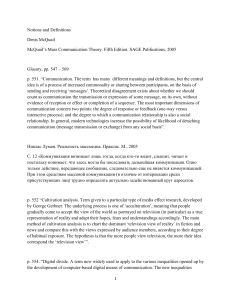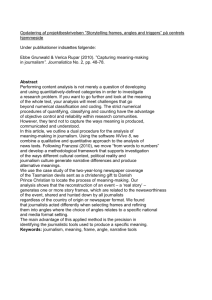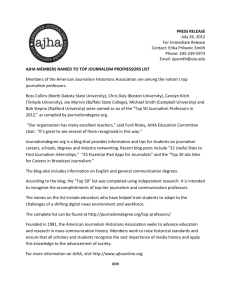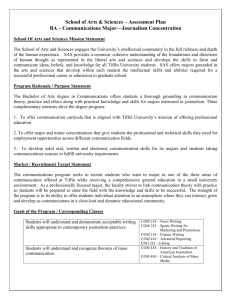Policy Journalism and Media Studies
advertisement
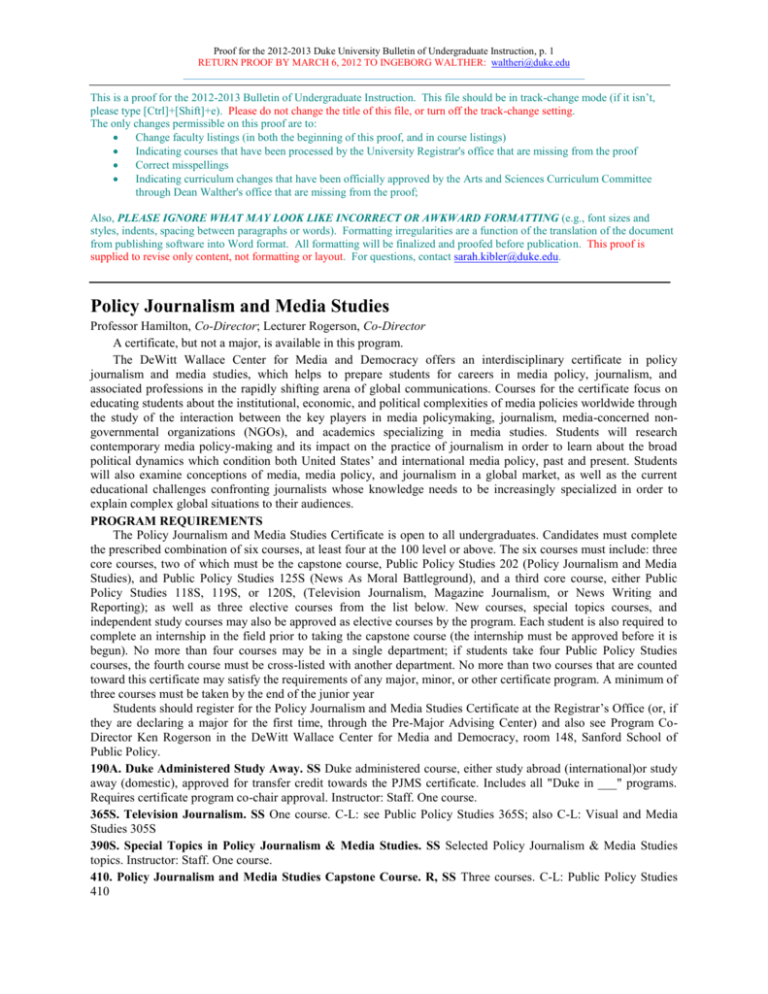
Proof for the 2012-2013 Duke University Bulletin of Undergraduate Instruction, p. 1 RETURN PROOF BY MARCH 6, 2012 TO INGEBORG WALTHER: waltheri@duke.edu ________________________________________________________________________________ This is a proof for the 2012-2013 Bulletin of Undergraduate Instruction. This file should be in track-change mode (if it isn’t, please type [Ctrl]+[Shift]+e). Please do not change the title of this file, or turn off the track-change setting. The only changes permissible on this proof are to: Change faculty listings (in both the beginning of this proof, and in course listings) Indicating courses that have been processed by the University Registrar's office that are missing from the proof Correct misspellings Indicating curriculum changes that have been officially approved by the Arts and Sciences Curriculum Committee through Dean Walther's office that are missing from the proof; Also, PLEASE IGNORE WHAT MAY LOOK LIKE INCORRECT OR AWKWARD FORMATTING (e.g., font sizes and styles, indents, spacing between paragraphs or words). Formatting irregularities are a function of the translation of the document from publishing software into Word format. All formatting will be finalized and proofed before publication. This proof is supplied to revise only content, not formatting or layout. For questions, contact sarah.kibler@duke.edu. Policy Journalism and Media Studies Professor Hamilton, Co-Director; Lecturer Rogerson, Co-Director A certificate, but not a major, is available in this program. The DeWitt Wallace Center for Media and Democracy offers an interdisciplinary certificate in policy journalism and media studies, which helps to prepare students for careers in media policy, journalism, and associated professions in the rapidly shifting arena of global communications. Courses for the certificate focus on educating students about the institutional, economic, and political complexities of media policies worldwide through the study of the interaction between the key players in media policymaking, journalism, media-concerned nongovernmental organizations (NGOs), and academics specializing in media studies. Students will research contemporary media policy-making and its impact on the practice of journalism in order to learn about the broad political dynamics which condition both United States’ and international media policy, past and present. Students will also examine conceptions of media, media policy, and journalism in a global market, as well as the current educational challenges confronting journalists whose knowledge needs to be increasingly specialized in order to explain complex global situations to their audiences. PROGRAM REQUIREMENTS The Policy Journalism and Media Studies Certificate is open to all undergraduates. Candidates must complete the prescribed combination of six courses, at least four at the 100 level or above. The six courses must include: three core courses, two of which must be the capstone course, Public Policy Studies 202 (Policy Journalism and Media Studies), and Public Policy Studies 125S (News As Moral Battleground), and a third core course, either Public Policy Studies 118S, 119S, or 120S, (Television Journalism, Magazine Journalism, or News Writing and Reporting); as well as three elective courses from the list below. New courses, special topics courses, and independent study courses may also be approved as elective courses by the program. Each student is also required to complete an internship in the field prior to taking the capstone course (the internship must be approved before it is begun). No more than four courses may be in a single department; if students take four Public Policy Studies courses, the fourth course must be cross-listed with another department. No more than two courses that are counted toward this certificate may satisfy the requirements of any major, minor, or other certificate program. A minimum of three courses must be taken by the end of the junior year Students should register for the Policy Journalism and Media Studies Certificate at the Registrar’s Office (or, if they are declaring a major for the first time, through the Pre-Major Advising Center) and also see Program CoDirector Ken Rogerson in the DeWitt Wallace Center for Media and Democracy, room 148, Sanford School of Public Policy. 190A. Duke Administered Study Away. SS Duke administered course, either study abroad (international)or study away (domestic), approved for transfer credit towards the PJMS certificate. Includes all "Duke in ___" programs. Requires certificate program co-chair approval. Instructor: Staff. One course. 365S. Television Journalism. SS One course. C-L: see Public Policy Studies 365S; also C-L: Visual and Media Studies 305S 390S. Special Topics in Policy Journalism & Media Studies. SS Selected Policy Journalism & Media Studies topics. Instructor: Staff. One course. 410. Policy Journalism and Media Studies Capstone Course. R, SS Three courses. C-L: Public Policy Studies 410 Proof for the 2012-2013 Duke University Bulletin of Undergraduate Instruction, p. 2 RETURN PROOF BY MARCH 6, 2012 TO INGEBORG WALTHER: waltheri@duke.edu ________________________________________________________________________________ Core Course Public Policy Studies 371. News as Moral Battleground Capstone Course Public Policy Studies 410. Policy Journalism and Media Studies Capstone Course Journalism Practical Core Course Cluster Public Policy Studies 365S. Television Journalism 366S. Magazine Journalism 367S. News Writing and Reporting 371. News as Moral Battleground 410. Policy Journalism and Media Studies Capstone Course Visual and Media Studies 305S. Television Journalism 306S. Magazine Journalism 307S. News Writing and Reporting Elective Courses Arts of the Moving Image 201. Introduction to Film Cultural Anthropology 150. Fantasy, Mass Media, and Popular Culture 170. Advertising and Society: Global Perspective (DS4) 272S. Advertising and Masculinity Documentary Studies 233S. American Communities: A Photographic Approach 415S. Advanced Documentary Photography English 181. Introduction to Film 210S. Creative Non-Fiction: Writing for Publication History 298. Genocide in the Twentieth Century International Comparative Studies 105. Fantasy, Mass Media, and Popular Culture 270. Eastern Europe in Transition: Markets, Media, and the Mafia Linguistics 170. Advertising and Society: Global Perspective (DS4) Literature 110. Introduction to Film Political Science 204AS. Duke Summer Program: London 331. Public Opinion (A) 622S. Media and Social Change 661S. Politics and Media in the United States (A, BI, PI) Public Policy Studies 364. Media and National Security 372. Information, Policy, and Ethics 376S. Telecommunications Policy and Regulation 397S. American Communities: A Photographic Approach 398S. Advanced Documentary Photography 590S. Advanced Topics in Public Policy 674. Media and Democracy 676. Media and Social Change 678. Media Policy and Economics Russian 350. Eastern Europe in Transition: Markets, Media, and the Mafia 516. Media and Social Change Sociology 221. Eastern Europe in Transition: Markets, Media, and the Mafia 360. Advertising and Society: Global Perspective (DS4) Theater Studies 171. Introduction to Film Visual Arts 217S. American Communities: A Photographic Approach 218S. Advanced Documentary Photography Visual and Media Studies Proof for the 2012-2013 Duke University Bulletin of Undergraduate Instruction, p. 3 RETURN PROOF BY MARCH 6, 2012 TO INGEBORG WALTHER: waltheri@duke.edu ________________________________________________________________________________ 225S. American Communities: A Photographic Approach 226S. Advanced Documentary Photography 244. Fantasy, Mass Media, and Popular Culture 246. Advertising and Society: Global Perspective (DS4) 289. Introduction to Film 304. Media and National Security 318. Eastern Europe in Transition: Markets, Media, and the Mafia 563. Media and Democracy


